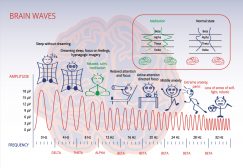Definition
noun, plural: pus cells
A dead polymorphonuclear white blood cell, i.e. neutrophil, found in pus.
Supplement
Pus corpuscles, together with infectious agents, cell debris, and tissue fluid, are the constituents of the pus formed at the site of infection or injury. They are neutrophils that have reached the site of infection as an immune response against infectious organisms (such as bacteria). The neutrophils engulf and kill the infectious foreign bodies, but eventually succumb in the process, and become part of this viscous exudates.
Also called: pus cell, pyocyte.
Dictionary > Pus corpuscle
You will also like...

Geological Periods
Geological periods is a study guide that cites the different geological periods on Earth's timeline. Each has a brief ov..

Pollution in Freshwater Ecosystems
There are many environmental factors that arise due to the usage of water in one way or another and for every action tha..

Developmental Biology
Developmental biology is a biological science that is primarily concerned with how a living thing grows and attains matu..

Water in Plants
The movement of molecules (specifically, water and solutes) is vital to the understanding of plant processes. This tuto..

Kidneys and Regulation of Water and Inorganic Ions
The kidneys are responsible for the regulation of water and inorganic ions. Read this tutorial to learn about the differ..

Sleep and Dreams – Neurology
While learning and intelligence are associated with the functions of a conscious mind, sleep and dreams are activities o..

